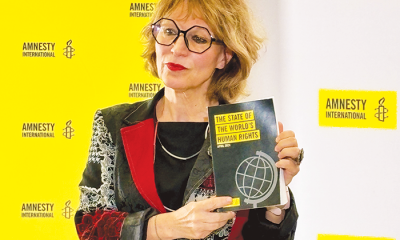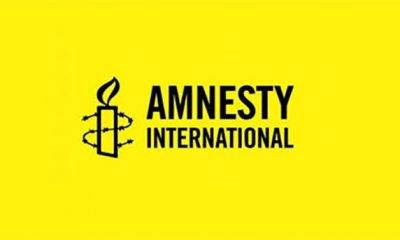News
AI asks govt. to ensure adequate nutrition for all pregnant and breastfeeding women

The Government of Sri Lanka must ensure access to adequate nutrition for all pregnant and breastfeeding women amid the ongoing economic crisis in the country, Amnesty International said yesterday (12).
The AI examined the impact of the economic crisis on access to nutrition for pregnant and breastfeeding women, with a particular focus on women living below the poverty line in Colombo. Falling incomes, loss of livelihoods and inflation have reduced women’s purchasing power while government-funded programmes aimed at increasing maternal nutrition have also been affected by the crisis.
“Due to the severity of the economic crisis in Sri Lanka, health and nutrition have taken a back seat. The situation has taken a grave toll on the health and well-being of pregnant and breastfeeding women. These individuals have also been disproportionately impacted by the crisis, which has seen poverty rates double in the space of a year due to the crisis,” said Dinushika Dissanayake, Amnesty International’s Deputy Regional Director for South Asia.
Amnesty International interviewed 45 people for this briefing, including healthcare workers, members of civil society, and pregnant and breastfeeding women from a variety of ethnic and religious backgrounds, all of whom live in informal settlements and tenement blocks in Colombo.
The women Amnesty International spoke to raise concerns about the unaffordability of food, the inconsistent supply of ‘Thriposha food supplements, and the inability to redeem food vouchers offered through government programmes.
Pregnant and breastfeeding women said they aimed to “fill their stomach” rather than consume recommended daily amounts of variety of nutrients due to the high cost of food. In order to have three meals a day, many opted to limit portion sizes, while some reduced their number of daily meals to two. One breastfeeding woman told Amnesty International: “We eat breakfast and dinner and try to skip lunch… We eat a biscuit for lunch with a cup of tea.”
In almost all households Amnesty International spoke to, consumption of meat, vegetables, fruit and milk had drastically reduced. Such deprivation increases the risk of nutrient deficiencies, which can affect the development of the foetus. Families that previously consumed meat or fish on a weekly basis now consume them just once a month or only when money is available. Another breastfeeding woman said: “We can’t afford milk-inducing food. You see fish is expensive. So, we buy what we can afford for the money we have.”
Most pregnant and breastfeeding women Amnesty International spoke to said that they were unemployed and their husbands did not have a regular income amid the economic crisis.
In February 2023, pregnant and breastfeeding told Amnesty International that government food vouchers, which are usually offered to pregnant and breastfeeding women, could not be redeemed due to a lack of state funds.
Amnesty International wrote to the Ministry of Women, the Ministry of Health and the Ministry of Public Administration to raise these concerns, but did not receive a response at the time of publication.
Sri Lanka’s public health system has also been affected by shortages of medicine and equipment. Health workers providing maternal care told Amnesty International that they had to stop, delay or postpone non-essential surgeries and procedures. One doctor, who said they have to ration drugs for emergency cases because future supplies are uncertain, told Amnesty: “We have to see patients suffering and we cannot do anything.”
Amnesty found that health workers reused equipment or told patients to purchase medicine or equipment from private pharmacies because state-run hospitals had run out. Meanwhile, medicines in private pharmacies remain unaffordable to most due to price hikes and the devaluation of the Sri Lankan Rupee.
Sri Lanka has ratified several international accords requiring it to ensure that pregnant and breastfeeding women have access to adequate healthcare and food, including the Convention on the Elimination of All Forms of Discrimination Against Women (CEDAW) and the International Covenant on Economic, Social and Cultural Rights (ICESCR).
“Prolonged food insecurity and inadequate nutrition can lead to serious long-term consequences for mothers and their children if left unaddressed. The Government of Sri Lanka must urgently meet its international human rights obligations, including by ensuring access to adequate, affordable and good quality nutrition for pregnant and breastfeeding women. The international community must also play a role in supporting the government to ensure pregnant and breastfeeding women are able to access adequate food and nutrition,” said Dinushika Dissanayake.
News
US sports envoys to Lanka to champion youth development

The U.S. Embassy in Colombo welcomed the U.S. Sports Envoys to Sri Lanka, former National Basketball Association (NBA) and Women’s National Basketball Association (WNBA) players Stephen Howard and Astou Ndiaye, from June 8 through 14.
The Public Diplomacy section of the U.S. Embassy said that it would launch a weeklong basketball program intended to harness the unifying power of sports, made possible through collaboration with Foundation of Goodness and IImpact Hoop Lab.
While in Sri Lanka, Howard and Ndiaye, both retired professional basketball players, will conduct a weeklong program, Hoops for Hope: Bridging Borders through Basketball. The Sports Envoys will lead basketball clinics and exhibition matches and engage in leadership sessions in Colombo and Southern Province for youth aged 14-18 from Northern, Uva, Eastern and Western Provinces, offering skills and leadership training both on and off the court. The U.S. Envoys will also share their expertise with the Sri Lanka Basketball Federation, national coaches, and players, furthering the development of basketball in the country. Beyond the clinics, they will collaborate with Sri Lankan schoolchildren to take part in a community service project in the Colombo area.
“We are so proud to welcome Stephen and Astou as our Sports Envoys to Sri Lanka, to build on the strong people-to-people connections between the United States and Sri Lanka,” said U.S. Ambassador Julie Chung. “The lessons that will be shared by our Sports Envoys – communication, teamwork, resilience, inclusion, and conflict resolution – are essential for leadership development, community building, equality, and peace. The U.S. Sports Envoy program is a testament to our belief that sports can be a powerful tool in promoting peace and unity.”
News
Rahuman questions sudden cancellation of leave of CEB employees

SJB Colombo District MP Mujibur Rahuman in parliament demanded to know from the government the reasons for CEB suspending the leave of all its employees until further notice from Thursday.
MP Rahuman said that the CEB has got an acting General Manager anew and the latter yesterday morning issued a circular suspending leave of all CEB employees with immediate effect until further notice.
“We demand that Minister Kanchana Wijesekera should explain this to the House. This circular was issued while this debate on the new Electricity Amendment Bill was pending. There are many who oppose this Bill. The Minister must tell parliament the reason for the urge to cancel the leave of CEB employees,” the MP said.However, Speaker Mahinda Yapa Abeywardena prevented Minister Wijesekera responding to the query and said that the matter raised by MP Rahuman was not relevant.
News
CIPM successfully concludes 8th Annual Symposium

The Chartered Institute of Personnel Management (CIPM) successfully concluded the 8th Annual CIPM Symposium, which took place on 31st May 2024. Themed “Nurturing the Human Element—Redefining HRM in a Rapidly Changing World,” the symposium underscored the pivotal role of human resource management (HRM) in today’s dynamic global landscape. Since its inception in 1959, CIPM has been dedicated to advancing the HR profession through education, professional development, and advocacy, solidifying its position as Sri Lanka’s leading professional body for HRM.
Ken Vijayakumar, the President of the CIPM, graced the occasion as the chief guest. The symposium commenced with the welcome address by the Chairperson, Prof. Arosha Adikaram, followed by the Web Launch of the Symposium Proceedings and Abstract Book by the CIPM President. The event featured distinguished addresses, including a speech by Chief Guest Ken Vijayakumar, President of CIPM, and an address by Guest of Honor Shakthi Ranatunga, Chief Operating Officer of MAS Holdings Pvt. Ltd., Sri Lanka.
The symposium also featured an inspiring keynote address by Prof. Mario Fernando, Professor of Management and Director of the Centre for Cross Cultural Management (CCCM) at the University of Wollongong, Australia.
Vote of Thanks of the inauguration session was delivered by Dr. Dillanjani Weeratunga, Symposium Co-chair.
The symposium served as a comprehensive platform for researchers to present their findings across a wide range of critical topics in HRM. These included Cultural Diversity and Inclusion, Talent Development and Retention, Ethical Leadership and Corporate Social Responsibility, Adapting to Technological Advancements, Mental Health and Well-being at Work, Global Workforce Challenges, Employee Empowerment, and Reskilling and Upskilling.
The plenary session was led by Prof. Wasantha Rajapakse. Certificates were awarded to the best paper presenters during the valedictory session, followed by a vote of thanks delivered by Kamani Perera, Manager of Research and Development.
The annual symposium of CIPM was a truly inclusive event, attracting a diverse audience that spanned undergraduates, graduates, working professionals, research scholars and lecturers. This widespread interest highlights the symposium’s significance in the field of HRM, offering a unique opportunity for everyone to network and learn from scholarly brains.The CIPM International Research Symposium was sponsored by Hambantota International Port, Sri Lanka Institute of Information Technology (SLIIT), E B Creasy & Co. PLC, and Print Xcel Company.
























